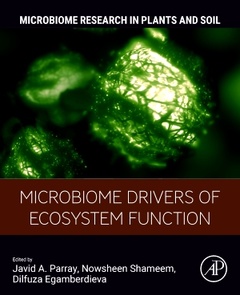Microbiome Drivers of Ecosystem Function Microbiome Research in Plants and Soil Series
Coordonnateurs : Parray Javid A., Shameem Nowsheen, Egamberdieva Dilfuza

Microbial inoculants provide ways in which food production efficiency can be improved. Plant growth-promoting soil organisms increase net crop uptake of soil nutrients, resulting in larger crops and higher yields of harvested food. These and other symbiotic associations between plants and microbes can ultimately be exploited for the increased food production necessary to feed the world, in addition to creating safer farming techniques that minimize ecological disruption.
2. Halophyte associated endophytic microbes: potential use in crop production
3. Overview of functional metagenomic profiling of root associated bacteria bacteria under salt stress.
4. Microbial Consortium with multifunctional plant growth-promoting attributes: Future Perspective in Agriculture
5. Plant root Endophytes: transformers of plant disease
6. Use of microbial consortia of PGP bacteria for preventing nematode diseases in plants
7. The efficiency of heavy metals-tolerant Bacillus sp. for alleviating heavy metals toxicity on sorghum
8. Biofertilizers and their role in plant growth and minimizing environmental impacts
9. Bioengineering of rhizobiome towards sustainable agricultural production
10. Advancements in understanding plant microbe and microbe interaction
11. Role of microbes to enhance underground functioning in high altitude mountain areas
12. Technological advancements and study of Engineered Microbiome in sustainable crop production
13. Microbial consortium: utility and delimitation
14. Technological intervention in the rhizosphere of tomato plants: a case study
15. Phytomicrobiome in modulating plant - growth and stress resilience: An insight into functions and emerging perspectives in agriculture
Assistant professor in Department of Environmental Science Cluster University Srinagar, Jammu and Kashmir, India, Dr. Shameem’s experience includes Project associate in DBT Sanctioned project entitled “spawn production for the entrepreneurs of Kashmir Valley at CORD, University of Kashmir.
Dilfuza Egamberdieva is a research associate at the Centre of Agricultural Landscape Research, Germany and head of Joint Uzbek-China Key Lab of Ecobiomes of Arid Lands, National University of Uzbekistan. Her research interests include microbial ecology and diversity, plant-microbe interaction, plant nutrition and stress tolerance, and plant biological disease control. She has been awarded the SCOPUS-2019 Award “Top Scientist of the Year, TWAS (The World Academy of Science) Award in Agricultural Sciences (2013), and TWAS-TWOWS-SCOPUS Young Women Research Award (2009), as well as several Fellowships such as President’s International Fellowship for Visiting Professors (PIFI), The Chinese Academy of Sciences (CAS), and the Georg Forster Research Fellowships, Alexander von Humboldt Foundation. She is a member of several journals’ editorial board, authored seven books published by Elsevier and Springer, and co-authored over 200 publications in per reviewed journals.
- Provides insights on engineered microbes in sustainable agriculture, recent biotechnological developments, and future prospects
- Introduces microbes as chief ecological engineers in reinstating equilibrium in degraded ecosystems
- Presents the current state and development, as well as future challenges in studying plant-microbe interactions
- Discusses endophytic microbiomes and other microbial consortium with multifunctional plant growth-promoting attributes
Date de parution : 10-2023
Ouvrage de 450 p.
19x23.4 cm
Thèmes de Microbiome Drivers of Ecosystem Function :
Mots-clés :
ACC deaminase; Actinobacterial symbiosis; Arbuscular mycorrhizal fungi; Arbuscular mycorrhizal fungi (AMF); Backwoods; Bioinformatics; Bioinoculants; Biological system elements; Biosurfactants; Biotic and abiotic stress; Biotic stress; Climate; Climatic changing condition; Community; Crop productivity; Degraded soils; Disintegration; Ecosystems; Ecology; Ecosystem; Ecosystem functions; Endosphere; Environment; Exopolysaccharides; Food security; GMO; Insect; Mangrove; Metabolites; Metagenome; Metagenomics; Metaomics; Microbial collaborations; Microbial community; Microbial consortium; Microbial diversity; Microbial interactions; Microbial symbionts; Microbiome; Microbiota; Microorganisms; Mutualism; Natural succession; Natural surroundings; Nickle mining; Nutrient cycling; Nutrient dynamics; Omics; Paddy field; Parasites; Pathogen; Phyllosphere; Phylogenetics; Phytomicrobiome; Phytostimulators; Plant growth; Plant growth–promoting bacteria; Plant growth–promoting microbes; Plant growth–promoting microorganism (PGPM); Plant growth–promoting rhizobacteria; Plant microbiome; Plant strengtheners; Plant–microbe interactions; Rehabilitation; Rhizobium; Rhizoremediation; Rhizosphere; Signaling network; Soil; Soil health; Soil microbial diversity; Soil properties; Soil rejuvenation; Stress tolerance; Sustainable agriculture; Symbiosis; Tomato; Tropical ecosystem; Weeds; Bioengineering; microbial consortia; sustainable; crop production; agro ecosystems; biotechnology



